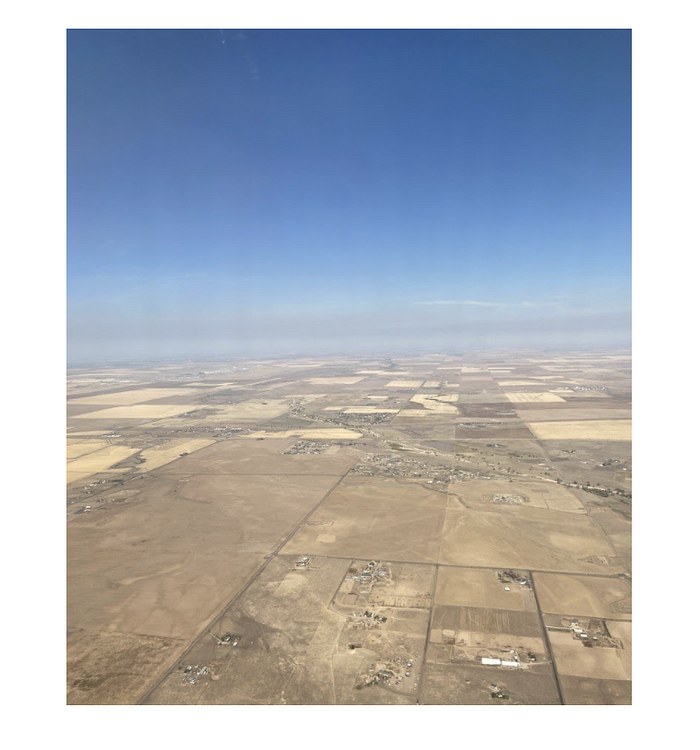We Are the Creators of our Own Reality

The idea that we (humans) are the creators of our own reality has never been so clear to me than when I was looking out the airplane window last week while down in Colorado (pictured left). The vast amounts of flat plains looked like an empty video game world about to be built, like all this space is waiting to be filled by humanity. We have so many areas so densely filled with people to the point that it’s becoming problematic, yet right before my eyes I’m seeing seemingly unlimited space not being used. But is it bad that my mind automatically turned to wanting to put something on this land, to urbanization? Is it a good thing that this land is left untouched? In the moment, I was imagining the amount of people this place could occupy, how whole new towns, communities, and societies could be built on this land. Truly anything could be put here. In the moment, reality felt like mine (or more generally, humans) for the taking, with limitless possibilities. And now, I can’t help but think about how Freire’s perception of reality applies to this.
“Education as the practice of freedom — as opposed to education as the practice of domination — denies that man is abstract, isolated, independent, and unattached to the world; it also denies that the world exists as a reality apart from people. Authentic reflection considers neither abstract man nor the world without people, but people in their relations with the world. In these relations consciousness and world are simultaneous: consciousness neither precedes the world nor follows it.” — Paulo Freire, Pedagogy of the Oppressed
Freire argues that the world, reality, and humans, are one with each other; we are not simply separate entities coexisting side by side, as we tend to learn in a banking education. I see how my minor epiphany relate to this, but with one minor exception. Before, I was giving humans all the credit — that is, it’s largely up to us to create reality on earth, on the world. My instinctive thoughts consisted of these banking education ideas, because that’s the only education I’ve experienced. As I thought about it more, though, I realized there is a part of my thoughts that were taking in Freire’s idea literally. I figured the reasons why there was nothing on this land largely had to do with the fact that the area is desolate, far away from essential resources for a normal standard of living. But in our new era of unimaginable innovation, surely there are ways to work with what is already there and apply newer innovations to make it a habitable area. Or, maybe the land is being used somehow and I just don’t know enough about the area to be aware of it. Or maybe it really is just unusable. I don’t know. I do know, though, that this personal reminder of there being this unequivocal opportunity for more of our world to be built, made possible through our innovation, is my own physical interpretation of Freire’s idea that humans create their reality by interacting with the world. He argues that neither earth nor human thought (“consciousness”) came first — it was the combination of both that has resulted in the world we have today. Our world is whatever humans want to make of it, but humans can’t also get all the credit. Our buildings, our roads, our social norms, our communities…all were built through our relations with the world and our relations with other people. And they still continue to be! As Freire continues in Pedagogy of the Oppressed, he says,
“This world to which he relates is not a static and closed order, a given reality which man must accept and to which he must adjust; rather, it is a problem to be worked on and solved.”
Well, here on this plane I was internalizing this. I was watching over what seems to me to be physical proof that our reality is not, in fact, static and unchanging. Freire is pointing out that there is always opportunity for more growth, to move forward and solve present day issues that result from humanity, that is also always ever-changing. That growth can be physically, in the case of the land I was seeing or in the way we keep creating new technologies. Growth is also always happening abstractly, like in the way societal norms are always changing, as we can currently see in the fight for an anti-racist society.
This certainly is not the first time I’ve seen such vast amounts of land before, but it’s the first time I’ve had such specific and Freire-related thoughts at a random time. Every time I see something similar to this from now on, though, I know I will be reminded of the idea that we are the creators of our own reality, and each cannot exist without each other.










